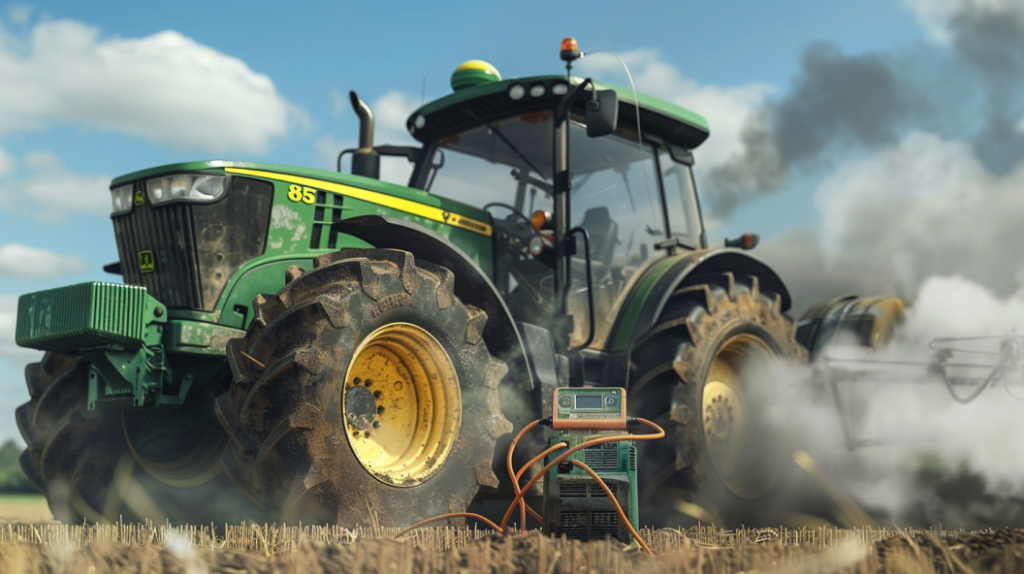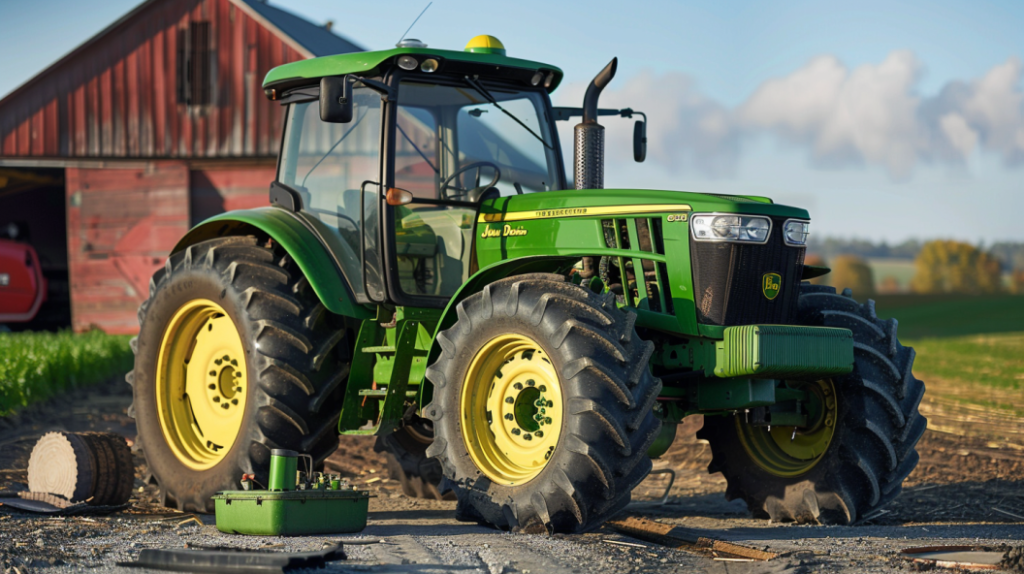If your John Deere 855 tractor is feeling like a puzzle with missing pieces, where the solution seems just out of reach, don’t worry, you’re not alone. From steering that feels as stubborn as a mule to a temperamental engine that resembles a finicky child, working through these issues can be challenging. But fear not, as we unravel the complexities of troubleshooting these problems, shedding light on practical solutions to help you regain control of your trusty green machine.
Key Takeaways

- Check power steering fluid levels and pump for steering issues.
- Address engine reliability concerns promptly for peak performance.
- Systematically troubleshoot electrical faults starting with battery and wiring.
- Inspect fuel system components like filters, lines, and injectors for problems.
- Perform regular preventative maintenance checks to ensure optimal performance.
Steering Issues
If you’re experiencing steering issues with your John Deere 855, it’s crucial to diagnose the problem accurately to guarantee safe and efficient operation. One common problem is difficulty in turning the steering wheel, which can be caused by low power steering fluid levels or a malfunctioning power steering pump. Check the power steering fluid reservoir and top it up if necessary. If the issue persists, the power steering pump may need to be inspected and possibly replaced.
Another steering problem could be excessive play in the steering wheel, leading to poor vehicle control. This might be due to worn out steering components such as the tie rods or steering gearbox. Inspect these parts for any signs of damage or wear and replace them if needed.
Additionally, improper wheel alignment can also cause steering issues. Make sure that the wheels are aligned correctly according to the manufacturer’s specifications to avoid handling problems.
Engine Reliability Concerns
When encountering engine reliability concerns on your John Deere 855, it is imperative to address potential issues promptly to guarantee peak performance and longevity. The engine is the heart of your tractor, and any hiccups can disrupt its functionality. Below is a table outlining common engine reliability concerns and possible troubleshooting steps:
| Engine Reliability Concerns | Troubleshooting Steps |
|---|---|
| Engine overheating | Check coolant levels and hoses for leaks. Clean radiator fins. |
| Excessive smoke | Inspect air filter, fuel filter, and oil level. Look for worn piston rings. |
| Hard starting | Test the battery and inspect the starter motor. Check fuel quality. |
| Loss of power | Examine air intake system and fuel injectors. Inspect for clogged filters. |
| Unusual noises | Check for loose components like belts or pulleys. Inspect the exhaust system. |
Electrical Faults

Addressing electrical faults on your John Deere 855 requires a systematic approach to pinpoint and resolve issues efficiently. When encountering electrical problems, start by checking the battery to make sure it’s fully charged and the terminals are clean and tightly connected.
Inspect the wiring harness for any signs of wear, corrosion, or loose connections that could be causing a disruption in the electrical flow. Test the fuses and replace any that are blown to prevent further damage to the electrical system.
Additionally, examine the switches, such as the ignition switch, lights switch, or PTO switch, to see if they’re functioning correctly. Faulty switches can lead to various electrical issues on your John Deere 855.
If all these components check out, consider testing the voltage regulator and alternator to confirm they’re supplying the correct amount of power to the system. By methodically troubleshooting each electrical component, you can identify and rectify any faults, ensuring your John Deere 855 operates smoothly.
Fuel System Problems

To maintain peak performance of your John Deere 855, it’s crucial to promptly address any fuel system problems that may arise.
When encountering fuel system issues, start by checking the fuel filter for clogs or dirt accumulation. A dirty filter can restrict fuel flow, leading to poor engine performance.
Inspect fuel lines for any signs of damage, leaks, or blockages that could disrupt the fuel supply. Additionally, make sure the fuel pump is functioning correctly by testing its pressure output.
If your John Deere 855 is experiencing difficulties starting or stalling during operation, the fuel injectors might be a potential culprit. Dirty or faulty injectors can cause uneven fuel distribution, affecting the engine’s efficiency. It’s recommended to clean or replace the injectors if necessary.
Monitor the fuel tank for sediment buildup, as this can contaminate the fuel system over time. Regularly draining and cleaning the tank can prevent these issues and maintain top engine performance.
Addressing fuel system problems promptly will ensure your John Deere 855 operates smoothly and efficiently.
Preventative Maintenance Tips

Regularly scheduled maintenance is essential to guarantee peak performance and longevity of your John Deere 855. Here are three preventative maintenance tips to keep your tractor running smoothly:
- Regular Fluid Checks: Make sure you check and maintain proper levels of engine oil, hydraulic fluid, coolant, and fuel. Regularly changing these fluids according to the manufacturer’s recommendations will help prevent overheating, corrosion, and excessive wear on important components.
- Air Filter Maintenance: The air filter plays a critical role in preventing dirt and debris from entering the engine, which can cause damage over time. Check the air filter regularly and replace it when dirty or clogged to maintain excellent engine performance.
- Greasing Moving Parts: Your John Deere 855 has various moving parts that require proper lubrication to prevent friction and wear. Regularly grease components such as pivot points, bushings, and bearings to ensure smooth operation and extend the lifespan of these parts.
Frequently Asked Questions
Can the John Deere 855 Handle Heavy-Duty Attachments?
Certainly, the John Deere 855 is well-equipped to handle heavy-duty attachments effortlessly. Its sturdy construction and strong engine offer the power required for challenging tasks.
Whether it’s a backhoe, loader, or mower, this machine can manage a variety of attachments without any difficulty. Just make sure you adhere to proper maintenance and operating guidelines to optimize performance and longevity.
You’ll be impressed by the versatility and efficiency of this workhorse.
How Often Should I Change the Hydraulic Fluid?
When maintaining your John Deere 855, changing hydraulic fluid is essential. To guarantee peak performance and prevent damage, replace the hydraulic fluid every 500 hours of operation or once a year, whichever comes first.
Regular fluid changes help maintain proper lubrication and hydraulic system function, prolonging the lifespan of your equipment. Stay diligent with this maintenance task to keep your John Deere 855 running smoothly and efficiently.
Is There a Common Issue With the Transmission?
Transmission issues can arise in John Deere 855 models due to wear and tear on components like gears, seals, or clutch plates. Symptoms may include slipping gears, rough shifting, or unusual noises.
Regular maintenance, such as checking fluid levels, can help prevent problems. If issues persist, consult a professional mechanic for a thorough inspection and potential repairs to keep your machine running smoothly.
What Is the Average Lifespan of the Tires?
On average, the lifespan of the tires for a John Deere 855 can vary depending on factors like usage, maintenance, and terrain.
With proper care, regular inspections, and appropriate tire pressure, you can expect the tires to last around 5 to 7 years.
However, heavy use or rough terrain may decrease this lifespan.
Keep an eye on tread wear and signs of damage to guarantee peak performance and safety.
Are There Any Known Issues With the PTO System?
Yes, there are common issues with the PTO system on the John Deere 855. Look out for problems like PTO not engaging, strange noises when the PTO is activated, or the PTO shaft spinning irregularly.
These issues can often be traced back to worn-out PTO clutch plates, faulty PTO switches, or damaged wiring. Regular maintenance and inspections can help guarantee these problems are prevented and the PTO system functions smoothly.
Conclusion
In summary, addressing steering issues, engine reliability concerns, electrical faults, and fuel system problems promptly is essential for maintaining peak performance of your John Deere 855 tractor.
Did you know that regular maintenance can help prevent up to 80% of common issues with tractors like the John Deere 855?
By following this troubleshooting guide and implementing preventative maintenance tips, you can keep your tractor running smoothly and efficiently for years to come.
Leave a Reply